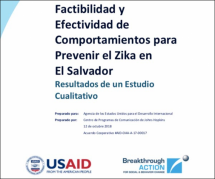Feasibility and Effectiveness of Behaviors to Prevent Zika in El Salvador: Results of a Qualitative Study
This qualitative research report (available in English and Spanish) details the findings of formative research that sought to understand the perceptions of the effectiveness and feasibility of Zika prevention actions in El Salvador.
The study focused on pregnant women, men with a pregnant partner, and women likely to become pregnant in the near future. The report also provides recommendations for implementers of future Zika and other mosquito-borne prevention programming.
Source: Breakthrough ACTION/Johns Hopkins Center for Communication Programs
Date of Publication: April 13, 2020
SIMILIAR RESOURCES
Tools
Examples
- Social Behavior Change Programming for Public Health Emergencies: Lessons Learned from the USAID Zika Response in Latin America and the Caribbean
- Strengthening the USAID Zika Response: Experiences from the Zika Social and Behavior Change Working Group
- Behavior Prioritization to Improve SBC Programming During a Public Health Emergency: A Call To Action
- Lessons Learned for SBC Programming from the USAID Zika Response
- Technical Specifications Content Guide for Behaviors with High Potential to Prevent Zika
- Zika Prevention Behavior Matrix
- Effective Behaviors to Prevent Zika
- Zika Communication Network
- Zika App
- Technical Specifications Content Guide for Behaviors with High Potential to Prevent Zika
- Programmatic Implications of Zika-Related Knowledge, Attitudes, and Practices
- Perceptions About Zika-related Prevention Behaviors in the Dominican Republic: Findings and Implications from a Qualitative Study
- Zika and My Baby? / Zika a mi bebe?
- Evidence-Based Prioritization Process to Identify Behaviors for Zika Prevention
- Empowering Communities to Fight Zika: Capacity Strengthening During the Zika Outbreak Response

